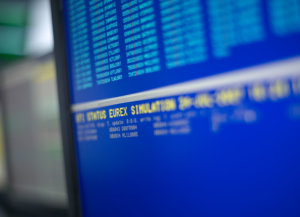No Oktoberfest for Deutsche Boerse
One puzzling feature of Deutsche Boerse’s business, however, is the decline in its STOXX index derivatives business in which volumes traded have been falling since the peak seen in March this year, even though assets under management in DAX index and STOXX related ETFs have held up well.

German exchange operator Deutsche Boerse has released its October 2020 trading data, providing industry watchers with another chance to look for trends and compare current turnover figures with those from earlier in the year.
The company which operates the Eurex exchange and Xetra trading platforms also operates in areas such as derivatives clearing and foreign exchange.
In cash equities, October’s volumes of €146 billion were not dissimilar to those posted in September and were ahead of comparable figures from 2019, which came in €135.40 billion.
Octobers numbers took the year to date cash equity turnover traded on the Xetra order book to 1.7193 trillion well ahead of the 2019’s €1.264 trillion.
2020 figures were of course flattered by a surge in equity trading as markets cratered and then rebounded sharply, in the wake of coronavirus and the stimulus measures that were deployed to offset its effects.
Volumes traded on the Eurex derivatives exchange were down year over year, with October 2020 total turnover coming in at 126 million contracts compared to 2019’s 164.4 million lots, a fall of -23%.
Year to date Eurex volumes are running -5.0% behind the turnover seen in 2019, though there are areas where turnover has increased in 2020. Notably equity Index derivatives where volumes traded were up by 11%, and in outstanding volumes of OTC cleared contracts which have risen by 46% compared to the figures for October 2019.
Another growth area for Deutsche Boerse has been exchange-traded products such as ETFs, ETC’s and ETNs. And here turnover rose to €17.80 billion, up by 37% compared to the October 2019 data. That improvement has helped to push year to date turnover to €205.80 billion, a figure which itself is 69% up on this period last year.
One puzzling feature of Deutsche Boerse’s business, however, is the decline in its STOXX index derivatives business in which volumes traded have been falling since the peak seen in March this year, even though assets under management in DAX index and STOXX related ETFs have held up well.
Could it be then that traders are turning to ETFs as an alternative to index futures trading, and could those market makers, who trade in ETFs, be using alternative hedges other than the adjacent futures contracts?
Deutsche Boerse’s own share price has enjoyed a +10.40% rally over the last month, though it remains well below its year to date highs of just over €170.0. However, the stock has outperformed the share prices of rivals such as the CME and CBOE over the course of 2020 to date.









